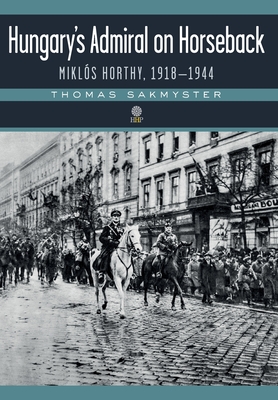Hungary's Admiral on Horseback: Miklós Horthy, 1918-1944

Hungary's Admiral on Horseback: Miklós Horthy, 1918-1944
Admiral Horthy's political career spanned a good part of the first half of the twentieth century, yet he was by no means a modern statesman. The most familiar image we have of him is the man on horseback, a throwback to an earlier age. His social and political views reflected a yearning for a Europe untouched by the doctrines of the French Revolution. His concepts of gentlemanly honor and chivalry had their roots in the Middle Ages.
Where does Miklós Horthy stand in relation to contemporary European leaders? What does a study of his career reveal about Hungarian, and in a broader sense, European history in the era of the two world wars? Although in some ways Horthy as a statesman was sui generis, he does resemble other Europeans who were products of the political and intellectual milieu of the late nineteenth
century and for whom World War I and its revolutionary aftermath were a traumatic experience.
Interwar Hungary had to balance precariously between the two most sinister totalitarian regimes of world history. In the ultimately hopeless task of preserving Hungarian independence while at the same time working toward a revision of the hated Treaty of Trianon, Horthy at times tilted dangerously toward Nazi Germany. But in the end he always shrank from the employment of totalitarian methods in Hungary. Several times in the late 1930s and at any point in World War II, Horthy could have used his immense power and authority to establish a pro-German, radical right-wing government in Hungary.
But he did not give his approval, for he had a fundamental, if sometimes grudging, respect for Hungarian political traditions. Horthy made it possible for the adherents of democratization, liberalism, parliamentary government, and social reform to maintain a precarious foothold in Hungarian society, so that when the totalitarian tide eventually receded from Hungary, they would be on hand to take part in the rebuilding of the country.
PRP: 372.00 Lei
Acesta este Prețul Recomandat de Producător. Prețul de vânzare al produsului este afișat mai jos.
334.80Lei
334.80Lei
372.00 LeiLivrare in 2-4 saptamani
Descrierea produsului
Admiral Horthy's political career spanned a good part of the first half of the twentieth century, yet he was by no means a modern statesman. The most familiar image we have of him is the man on horseback, a throwback to an earlier age. His social and political views reflected a yearning for a Europe untouched by the doctrines of the French Revolution. His concepts of gentlemanly honor and chivalry had their roots in the Middle Ages.
Where does Miklós Horthy stand in relation to contemporary European leaders? What does a study of his career reveal about Hungarian, and in a broader sense, European history in the era of the two world wars? Although in some ways Horthy as a statesman was sui generis, he does resemble other Europeans who were products of the political and intellectual milieu of the late nineteenth
century and for whom World War I and its revolutionary aftermath were a traumatic experience.
Interwar Hungary had to balance precariously between the two most sinister totalitarian regimes of world history. In the ultimately hopeless task of preserving Hungarian independence while at the same time working toward a revision of the hated Treaty of Trianon, Horthy at times tilted dangerously toward Nazi Germany. But in the end he always shrank from the employment of totalitarian methods in Hungary. Several times in the late 1930s and at any point in World War II, Horthy could have used his immense power and authority to establish a pro-German, radical right-wing government in Hungary.
But he did not give his approval, for he had a fundamental, if sometimes grudging, respect for Hungarian political traditions. Horthy made it possible for the adherents of democratization, liberalism, parliamentary government, and social reform to maintain a precarious foothold in Hungarian society, so that when the totalitarian tide eventually receded from Hungary, they would be on hand to take part in the rebuilding of the country.
Detaliile produsului










